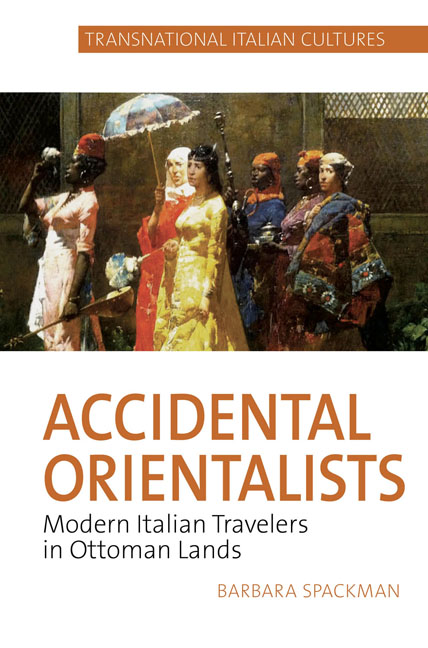Book contents
- Frontmatter
- Contents
- List of illustrations
- Acknowledgements
- Preface
- Chapter One Detourism: The Orientalism of Amalia Nizzoli's Egyptian Memoirs
- Chapter Two Hygiene in the Harem: The Orientalism of Cristina Trivulzio di Belgiojoso
- Chapter Three Male Masquerade in Mecca: Passing and Posing in Nineteenth-Century Egypt
- Chapter Four Muslim in Milan: The Orientalisms of Leda Rafanelli
- Epilogue Divorce Islamic Style: Passing and Posing as Muslim and Tunisian in Postcolonial Italy
- Works Cited
- Index
Preface
- Frontmatter
- Contents
- List of illustrations
- Acknowledgements
- Preface
- Chapter One Detourism: The Orientalism of Amalia Nizzoli's Egyptian Memoirs
- Chapter Two Hygiene in the Harem: The Orientalism of Cristina Trivulzio di Belgiojoso
- Chapter Three Male Masquerade in Mecca: Passing and Posing in Nineteenth-Century Egypt
- Chapter Four Muslim in Milan: The Orientalisms of Leda Rafanelli
- Epilogue Divorce Islamic Style: Passing and Posing as Muslim and Tunisian in Postcolonial Italy
- Works Cited
- Index
Summary
This book examines a set of narratives authored by inhabitants of the Italian peninsula who, through the historical accidents of forced exile, desertion, or opportunism, traveled to Ottoman-governed lands during the nineteenth and early twentieth centuries and wrote about their experiences. It argues that the porous and riven national identities of these Italian travelers positioned them differently than their British and French counterparts in relation to the predominantly Muslim world in which they found themselves, and to which, in some cases, they came to belong. Mindful of the historical relation of the Italian peninsula and its population to the Mediterranean world, and, at least from the seventeenth century until 1861, of Italy as a dominated fraction of the dominant world, and hence as Europe's internal other in the modern period, the book is attentive to the ways in which the particular strand of “Accidental Italian Orientalism” that it identifies may be said to have a cultural and historical specificity of its own. Italians, after all, and especially southern Italians, were themselves subjected to an Orientalization on the part of northern Europeans, and the fact that Italian was the lingua franca of the Mediterranean for centuries positioned its speakers in the Mediterranean world differently from northern Europeans. Indeed, if Edward Said wrote little about Italian Orientalism (with the exception of side glances to Marco Polo and Dante), and the field of postcolonial studies has largely followed in his wake in this respect, it is likely in large part because the Italian case departs significantly from those of Britain and France, where philology, secularization, and the discipline and institutionalization of Orientalism went hand in hand in the nineteenth century. In Italy, instead, the Neapolitan institution that now goes by the name of “Oriental” (the Università degli studi di Napoli “L'Orientale”) was founded in 1732 by a missionary as the “College of Chinese,” whose goal was to train young Chinese so that they might return to China and propagate Catholicism; only in 1888 was its missionary goal officially abandoned, and only in the 1920s did a secular school of Orientalism, linked with a colonial program, take shape.
- Type
- Chapter
- Information
- Accidental OrientalistsModern Italian Travelers in Ottoman Lands, pp. 1 - 12Publisher: Liverpool University PressPrint publication year: 2017



